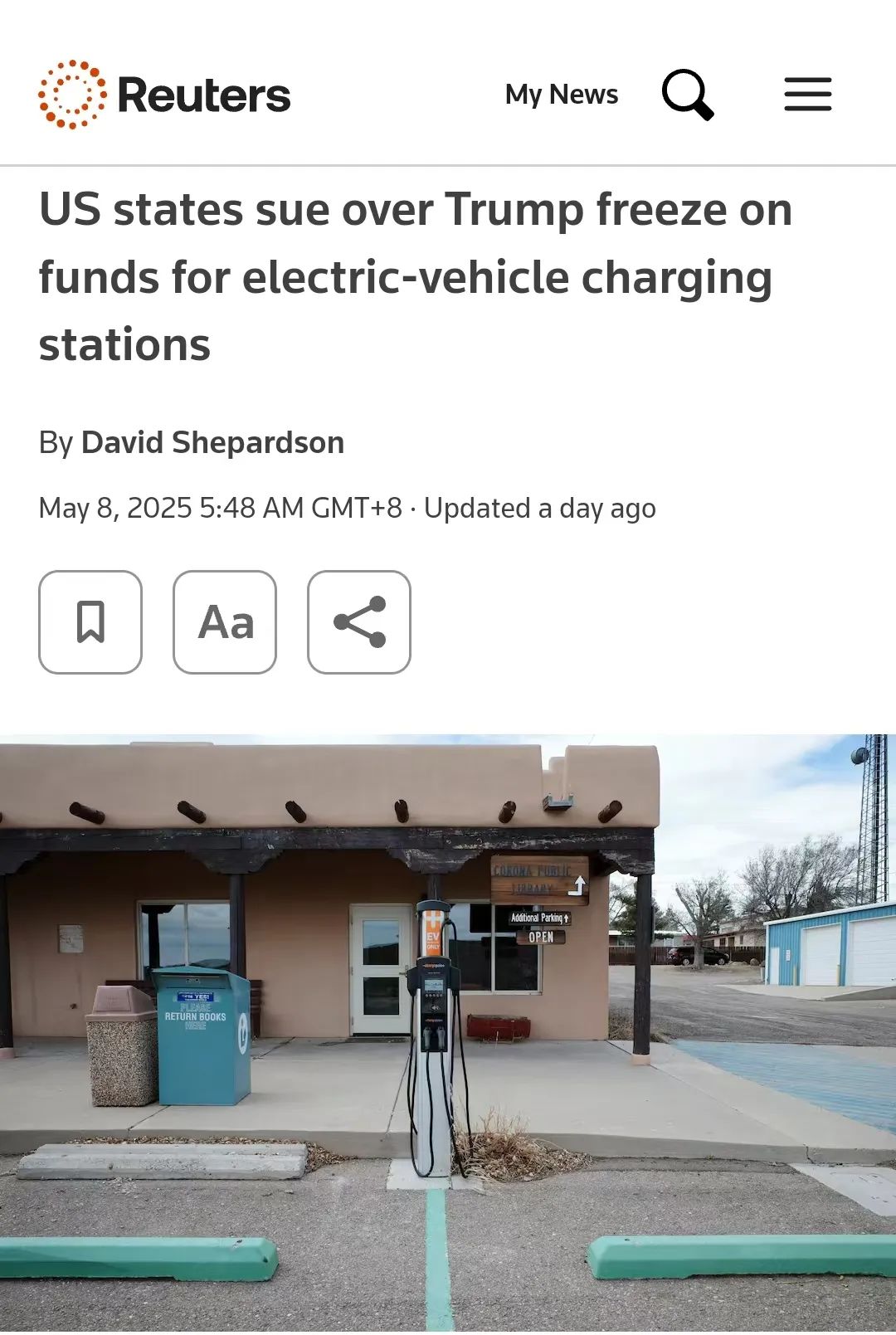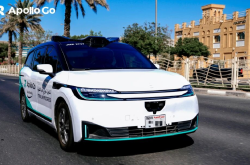["Car Talk of the Week": 17 US States Sue Trump Over Electric Car Policies
![]() 05/12 2025
05/12 2025
![]() 650
650
Introduction
By 2030, there may only be 200,000 charging stations on US highways, half the previous estimate.
This week, a coalition of 17 US states jointly sued President Trump twice. The first lawsuit was regarding the development of the wind energy industry, and the second focused on the funding plan for electric vehicle charging stations.
On his first day in office, Trump signed an executive order suspending approvals, permits, and loans for all onshore and offshore wind energy projects in the US. On Monday, led by the attorneys general of Washington DC and 17 states, they jointly opposed this plan, arguing that it undermined the long-term growth of the wind energy sector and the US energy landscape.
This collective legal action caught Trump off guard, and the White House has yet to issue an official response. Two days later, the same group of 17 states and Washington DC turned their attention to Trump's electric vehicle policy, accusing him of halting a federal funding plan for electric vehicle charging stations and illegally redirecting billions of dollars originally intended for their construction.

In 2021, under President Biden's administration, the Bipartisan Infrastructure Act passed the electric vehicle infrastructure plan, allocating up to $5 billion for the installation of charging station infrastructure along interstate highways.
Over the past few years, approximately $3.3 billion has been distributed to various states. However, Trump halted this plan in February 2023, citing the need to "reevaluate the priorities of federal environmental protection projects." As a result, not only were the remaining funds unable to be disbursed, but the already allocated funds could not be utilized either.
This lawsuit, again led by the state attorneys general, directly targets Trump's "illegal directive." The states argue that since Congress approved the funds, only Congress has the authority to determine subsequent funding allocations and track the funds' usage. Trump's actions clearly exceed his authority.
California Attorney General Rob Bonta criticized Trump's approach as "self-serving," short-sighted, and potentially illegal. The immediate impact of suspending the funding plan for electric vehicle charging stations could result in direct losses of up to $300 million, equivalent to approximately RMB 2.17 billion.
Taking New York State as an example, it has received over $175 million (approximately RMB 1.267 billion) in funding from the grant program. However, since Trump's inauguration, $120 million (approximately RMB 869 million) has been withheld, leading to the temporary suspension of many projects and the loss of thousands of jobs.
Regarding the future of the US automotive industry, Biden and Trump hold opposing views. During Biden's term, he proposed ambitious electric vehicle plans aimed at reducing carbon emissions and promoting clean energy. Trump strongly opposed these plans and one of his first acts in office was to overturn many of Biden's initiatives and rescind multiple funding programs designed to boost the use of fossil fuels.
The CEO of US electric vehicle charging station supplier Vontier Corp. estimated that if the Trump administration persists in cutting federal funds, the installation rate of electric vehicle charging stations in the US will drastically decline. By 2030, there could be only 200,000 charging stations on US highways, half the previous projection.
Prior to the election, Tesla founder Elon Musk was a supporter of Trump, but the president's actions after taking office completely disillusioned the "Iron Man." Tesla was also a beneficiary of Biden's previous charging station funding plan, receiving a total of $31 million in government funding, which has helped expand charging station coverage across the US.
Now, Musk, who once led the Department of Government Efficiency (DOGE), no longer works in the White House. He has had several contentious confrontations with Trump and has been publicly mocked by the latter. During a live-streamed meeting, Trump humiliated Musk, stating, "I don't need Musk to do anything anymore. I just happened to favor him before, but now, that favor is gone."
At the University of Alabama's graduation ceremony on May 1, Trump spoke negatively about Musk in front of school leaders and graduates, alluding to a billionaire who strongly opposed him during his first term but suddenly changed his tune during his second term, starting to flatter and ingratiate himself. The billionaire in question was none other than Musk.
Trump's radical actions even drew criticism from California Governor Gavin Newsom. California's GDP is only slightly inferior to that of Germany and Japan, consistently ranking among the top 5 globally in recent years. Governor Newsom is also a hardliner who directly challenged Trump late last year, stating that if the federal $7,500 electric vehicle subsidy were canceled, the California government would pay for it and subsidize the electric vehicle industry.
Although Newsom and Musk have had a tense relationship, with Musk relocating Tesla's headquarters from California to Texas due to disappointment with California policies, this time Newsom set aside their differences and stood by Musk. He sarcastically remarked to Trump, "Instead of promoting Tesla in front of the White House, why don't you return the charging station subsidy that originally belonged to the company?"
So far, Trump has not commented on the joint lawsuit filed by 17 states. However, based on news from the past week, it appears he is preoccupied with "more important matters" such as tariffs and has not had time to respond to domestic opposition.
Just this week, the US and the UK finalized a new trade agreement, promising to strengthen industrial and agricultural market access between the two countries and further simplify customs procedures for US exports. Under the agreement, the first 100,000 cars exported to the US by British automakers each year will be subject to a reciprocal tariff rate of 10%, with other cars facing a tariff rate of 25%.
Since Trump took office, the impact of tariffs on the automotive sector has been a global focus. After the US and the UK signed the latest trade agreement, the industry has been particularly attentive to the negotiation space with other countries. However, based on Trump's attitude, it seems he does not want the "UK model" to be replicated elsewhere. He stated at a media meeting that the relationship between the US and the UK is special and that "the same deal in the automotive sector is not planned for the future."
However, it is not so much that the UK case is unique but rather that such a trade agreement best serves the real interests of the US itself.
The Nikkei Asian Review commented that fundamentally, the UK occupies a different position from other countries, including Japan. The US has a trade deficit of $68.5 billion with Japan but a trade surplus of $11.9 billion with the UK. The Trump administration is committed to reducing the trade deficit, and signing a favorable agreement with the UK benefits the US, so why not?
It is no surprise that Trump has no time to address the collective lawsuit filed by 17 states within his own country. After announcing the trade agreement, he happily posted on his social media platform Truth Social, "This is indeed a very important and exciting day for both the UK and the US!"
Editor-in-Charge: Shi Jie, Editor: Chen Xinnan





